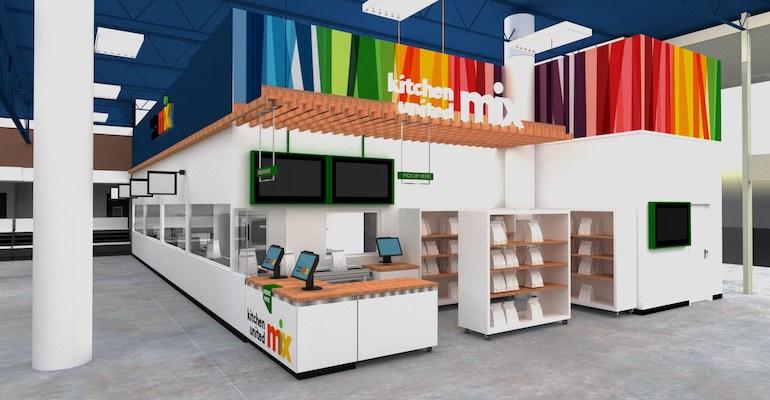Are we starting to see the long-term consequences of the ghost kitchen boom that peaked during the pandemic? While ghost kitchens have gone through ups and downs over the years — from regulatory challenges to the rise of false or misleading virtual brands — they might now be starting to wane in popularity and usefulness. Several months after we chronicled the failures (and subsequent sale of) virtual restaurant company Nextbite, Kitchen United has announced that the company has closed all of its Kitchen United MIX locations in Kroger supermarkets.
“We have closed all of Kitchen United locations operating inside of Kroger,” a Kitchen United spokesperson confirmed with Nation’s Restaurant News, though did not give more details about the reasons behind the closures. “We appreciate their partnership and support over the years. We are currently looking to pivot back into a software business.”
Kitchen United is a ghost kitchen commissary operator that traditionally combined elements of delivery technology, real estate, and virtual restaurant brands in its operations model. Now it looks like the company is shifting away from the real estate portion of its original business model as it shutters physical locations.
Kitchen United began partnering with Kroger in Aug. 2021, and started to open up virtual commissary locations inside select Kroger supermarkets. Customers were able to place orders online or via on-site kiosks where restaurant staff prepared food orders on-site. They were then able to pick up orders in person (perhaps while shopping) or have them delivered to their home via third-party delivery providers. In July 2022, Kroger was one of several major companies to announce investment with Kitchen United, as part of a $100 million fundraising round. At the time, Kitchen United was operating around 200 locations in Krogers across the United States.
The company has gone through multiple leadership changes over its lifetime, from cofounder and former CEO Massimo Noja De Marco, who grew the company to thousands of ghost kitchen locations and left Kitchen United in 2020; to Michael Montagano, who served as CEO of Kitchen United until August, when he left to become CEO of Dog Haus. Under Montagano’s leadership, Kitchen United acquired ghost kitchen developer Zuul, and began partnering with major brands like Restaurant Brands International, Kroger, Google Ventures, and Fidelity Investments.
Kitchen United did not give any further details on the new direction the company is taking, but it is not the only ghost kitchen company to announce an operational pullback. Crave Collective from Crave Hospitality Group — which opened in Nov. 2020 with chef Michael Mina as a hybrid ghost kitchen food hall with 16 locations and its own delivery fleet — has closed and is no longer operating, according to the Idaho Statesman. The app is no longer available for download and customers are no longer able to order from it because Crave Collective no longer exists:
“It’s closed. There’s no employees, no nothing,” Devin Wade, founder of Crave Collective told the Idaho Statesman. “As the market pivoted on us, and ghost kitchens became not a thing anymore, what we were left with was a model and technology, and not an operation.”
Wade further explained that Crave Collective licensed out the technology and business model to other groups, including a group called Crave Kitchens, which has no affiliation with the original Crave Hospitality Group. NRN was unable to get in touch with Wade for further in comment in time for the publication of this article.
Crave Collective launched in 2020 with the idea of expanding three of chef Michael Mina’s restaurant concepts to new markets through the ghost kitchen collective, including Tokyo Hot Chicken and StirFry. The plan was to eventually expand outside of Idaho and open 15 collectives in different markets across the U.S., starting with Dallas and Salt Lake City. Three years later, the company is defunct, and according to representatives for Michael Mina, began shutting down in early fall 2022.
“We are no longer working with Crave-- I'm trying to understand when the relationship stopped,” a representative for chef Michael Mina said. “I believe we ended due to Crave completely changing their business model and getting out of food service operations. That model meant closing down the cloud kitchen they were operating in Boise.”
With the news that three major virtual brand and ghost kitchen companies have been sold, changed business models, or shut down altogether, the future of the once-ubiquitous ghost kitchen model may be tenuous. Earlier this year, multiple restaurant brands announced or confirmed that they were moving away from the ghost kitchen model, including Wendy’s, BurgerFi, and Applebee’s. Although it is unlikely that ghost kitchens will die out completely, the mass success of delivery-focused restaurant commissary companies is a ghost of earnings quarters’ past.
Contact Joanna at [email protected]





